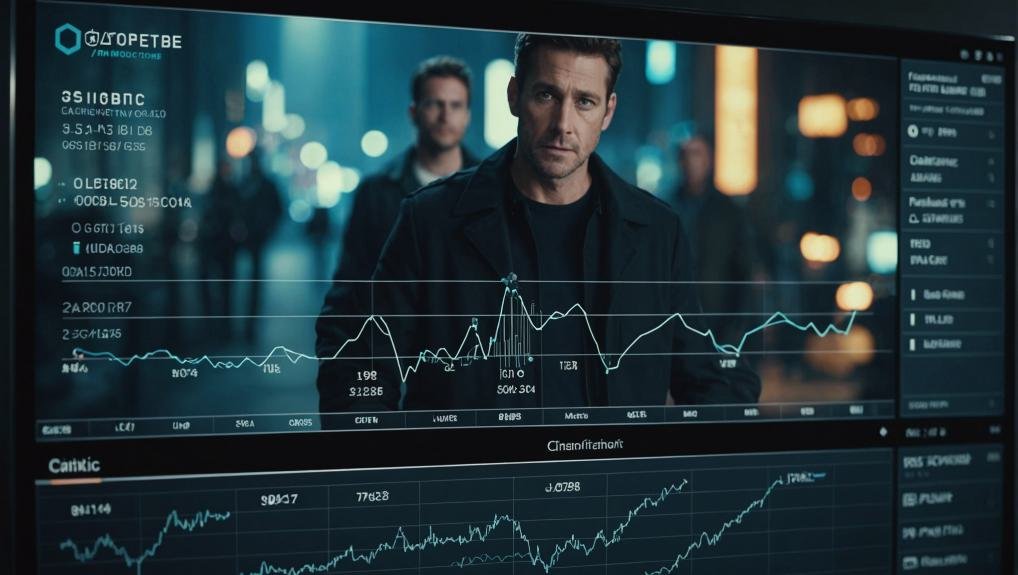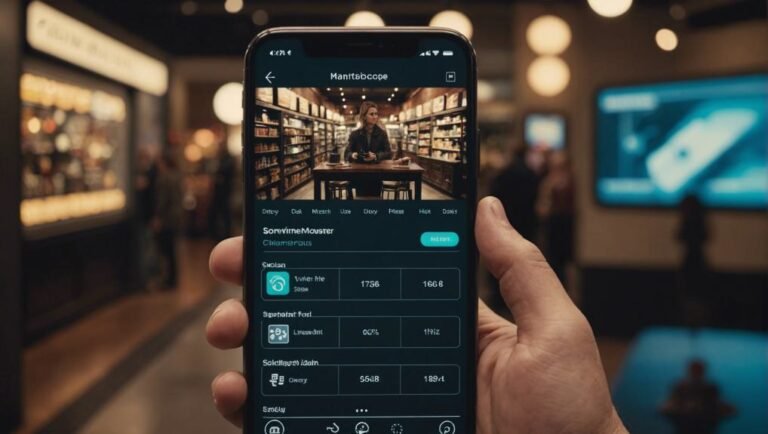AI for Programmatic Advertising
AI for Programmatic Advertising leverages advanced algorithms to enhance ad placements and targeting capabilities, altering campaign strategies. It enables precise audience segmentation and real-time optimizations, improving ad performance. Challenges in implementation include integrating complex AI systems and addressing data privacy concerns. AI-driven ad targeting guarantees effective audience reach, personalized content delivery, and efficient budget optimization. Real-time performance analytics provide immediate insights for data-driven decisions. Discover how AI reshapes ad inventory purchasing and enhances ad personalization to stay competitive in the dynamic digital advertising landscape.
The Rise of AI in Advertising
AI is revolutionizing the advertising industry by enhancing targeting capabilities and optimizing ad placements. The rise of AI in advertising has brought forth a paradigm shift in how campaigns are strategized and executed.
AI efficiency has enabled marketers to leverage data insights like never before, allowing for more precise targeting based on consumer behavior and preferences. Strategic planning has been streamlined through AI-powered algorithms that analyze vast amounts of data in real-time, providing valuable insights for campaign optimization.
While AI efficiency plays an important role in enhancing advertising strategies, it's essential to note that human creativity remains irreplaceable. AI can analyze data and suggest effective strategies, but it's human creativity that conceptualizes compelling ad campaigns that resonate with audiences on an emotional level.
Benefits of AI in Programmatic Ads
Shifting from the domain of general advertising to programmatic ads, the application of AI brings forth a multitude of benefits that revolutionize the way ad campaigns are managed and optimized. AI efficiency plays a pivotal role in enhancing the performance of programmatic ads, allowing for streamlined decision-making processes and real-time optimizations.
By leveraging AI algorithms, advertisers can analyze vast amounts of data swiftly, leading to more targeted and personalized ad placements that resonate with the intended audience. This increased level of precision in programmatic advertising guarantees that ads are delivered to the right users at the right time, ultimately resulting in higher conversion rates.
Moreover, AI's ability to automate tasks such as bid management and audience targeting contributes to improved ROI for advertisers. The automation of these processes not only saves time and resources but also enables campaigns to be continuously optimized based on performance data. As a result, advertisers can achieve greater cost-efficiency and effectiveness in their programmatic ad campaigns through the strategic implementation of AI technologies.
Challenges Faced in Implementation
Steering through the landscape of implementing AI for programmatic advertising presents a range of challenges that demand strategic solutions and meticulous planning. One of the primary hurdles is the implementation challenges stemming from the complexity of integrating AI systems with existing advertising technologies. These challenges often revolve around compatibility issues, data synchronization problems, and the need for specialized expertise to guarantee seamless operation.
Moreover, technology limitations can impede the full potential of AI in programmatic advertising. Issues such as processing power constraints, algorithm biases, and the lack of standardized frameworks can hinder the effectiveness of AI-driven campaigns. Addressing these limitations requires continuous research and development to enhance AI capabilities and refine algorithms.
Additionally, data privacy and ethical concerns pose significant obstacles in implementing AI for programmatic advertising. Safeguarding consumer data, ensuring transparency in automated decision-making processes, and complying with regulations like GDPR are critical considerations that necessitate careful navigation in the AI implementation journey. Balancing the benefits of AI with these ethical considerations is paramount to building trust with consumers and maintaining a positive brand image.
AI's Role in Audience Targeting
AI plays a pivotal role in enhancing audience segmentation by analyzing vast amounts of data to identify specific consumer groups with precision. This technology enables dynamic ad personalization, tailoring content to match individual preferences and behaviors, thereby improving engagement rates.
Additionally, AI's real-time optimization capabilities guarantee that ads are delivered at the most opportune moments to maximize impact and conversions.
Enhanced Audience Segmentation
To summarize, advanced algorithms and machine learning techniques empower marketers to achieve unparalleled precision in targeting specific audience segments for programmatic advertising campaigns. AI-driven segmentation enables personalized engagement by analyzing vast amounts of data to identify patterns and behaviors within the target audience. This approach allows for the creation of highly tailored campaigns that resonate with individual segments, increasing the likelihood of conversion.
By leveraging AI for audience segmentation, marketers gain valuable insights into consumer preferences and behaviors, enabling them to craft targeted messaging that speaks directly to the interests of each segment. This level of customization enhances the overall effectiveness of programmatic advertising by delivering relevant content to the right people at the right time.
Furthermore, AI's role in audience targeting goes beyond traditional demographic categorizations, diving deeper into psychographic and behavioral attributes. This granular understanding of the audience allows for more strategic decision-making in campaign planning and execution.
Dynamic Ad Personalization
How does dynamic ad personalization revolutionize audience targeting in programmatic advertising campaigns?
By leveraging advanced algorithms and predictive analytics, dynamic ad personalization enables personalized messaging and tailored recommendations to specific individuals, enhancing the effectiveness of advertising efforts considerably.
Through advanced algorithms, dynamic ad personalization analyzes vast amounts of data in real-time to create personalized messages that resonate with individual consumers. By considering factors such as browsing history, purchase behavior, demographics, and preferences, advertisers can deliver highly targeted ads that are more likely to capture the audience's attention and drive engagement.
Moreover, predictive analytics plays an important role in dynamic ad personalization by forecasting consumer behavior and preferences. This allows advertisers to anticipate the needs of their target audience and serve them with relevant content at the right moment, maximizing the chances of conversion.
In essence, dynamic ad personalization powered by advanced algorithms and predictive analytics represents a game-changer in audience targeting, enabling advertisers to deliver more relevant and impactful advertising experiences to consumers.
Real-Time Optimization Capabilities
Real-time optimization capabilities in programmatic advertising leverage cutting-edge algorithms to enhance audience targeting effectiveness through dynamic adjustments based on real-time data insights.
Machine learning plays a pivotal role in enabling these capabilities, allowing for the analysis of vast amounts of data at unprecedented speeds. By utilizing machine learning algorithms, programmatic advertising platforms can continuously optimize ad placements, bids, and targeting parameters to reach the most relevant audience segments with precision.
Algorithmic optimization further refines this process by automatically adjusting campaign settings based on real-time performance metrics. Through sophisticated algorithms, programmatic advertising platforms can adapt bidding strategies, creative variations, and audience targeting criteria in milliseconds, maximizing the efficiency and impact of ad campaigns.
This real-time optimization not only increases the likelihood of reaching the right audience at the right time but also improves overall campaign performance and return on investment. Embracing machine learning and algorithmic optimization in programmatic advertising is essential for staying ahead in the dynamic digital advertising landscape.
Enhancing Campaign Performance With AI
To enhance your campaign performance with AI, consider AI-driven ad targeting to reach your audience more effectively.
Automated budget optimization can help you allocate your resources efficiently based on real-time data and insights.
Additionally, real-time performance analytics enable you to make data-driven decisions swiftly to maximize the impact of your advertising efforts.
Ai-Driven Ad Targeting
By harnessing the power of artificial intelligence, ad targeting in programmatic advertising can be greatly enhanced, ultimately improving campaign performance and ROI. AI-driven ad targeting revolutionizes the way ads are delivered to potential customers by enabling unprecedented levels of targeting precision. Through sophisticated algorithms and machine learning capabilities, AI can analyze vast amounts of data in real-time to identify the most relevant audience segments for a particular ad. This targeted approach guarantees that ads reach the right people at the right time, increasing the likelihood of engagement and conversions.
The key advantage of AI-driven ad targeting lies in its ability to optimize ad performance by delivering personalized content to individual users based on their behavior, preferences, and demographics. By tailoring ads to specific audiences, advertisers can markedly improve click-through rates and conversions, leading to higher ROI. Additionally, AI continuously learns and adapts to changing trends and user behavior, ensuring that ad targeting remains effective and efficient over time.
Fundamentally, AI-driven ad targeting represents a paradigm shift in programmatic advertising, offering advertisers a potent tool to enhance campaign performance and drive business growth.
Automated Budget Optimization
Utilizing artificial intelligence, automated budget optimization in programmatic advertising plays a pivotal role in enhancing campaign performance by intelligently allocating resources for maximum impact. Automated bidding strategies driven by AI are designed to optimize ad spend efficiently. These strategies leverage data-driven decisions to adjust bids in real-time based on performance indicators, ensuring that your budget is allocated where it can yield the best results.
Algorithmic ad spending is at the core of automated budget optimization, employing sophisticated optimization algorithms to determine the most effective distribution of your advertising budget across various channels and audiences. By analyzing vast amounts of data and continuously learning from campaign outcomes, AI can adapt bidding strategies to maximize the return on investment.
Incorporating automated budget optimization into your programmatic advertising efforts enables you to streamline the management of your campaigns while improving overall performance. Leveraging AI-driven strategies empowers you to make informed decisions and achieve better results through efficient resource allocation.
Real-Time Performance Analytics
Real-time performance analytics powered by AI revolutionizes campaign optimization by providing immediate insights into ad performance metrics. With AI algorithms continuously analyzing data, you can swiftly identify trends in ad engagement and conversion rates.
By leveraging real-time analytics, you gain a competitive edge in adjusting ad placement and refining bidding strategies based on the most up-to-date performance data.
AI-driven real-time performance analytics offer a granular view of campaign effectiveness, enabling you to make data-driven decisions swiftly. These insights empower you to optimize ad placements by identifying the most effective channels and times to reach your target audience.
Additionally, AI can enhance bidding strategies by dynamically adjusting bids based on real-time performance indicators, maximizing your ROI.
Future Trends and Innovations
One key future trend in AI for programmatic advertising is the increasing integration of machine learning algorithms to optimize ad targeting and delivery. AI in creative is evolving to generate personalized and engaging ad content at scale, tailoring messages to specific audience segments with higher precision. This advancement not only enhances user experience but also boosts ad performance metrics.
Moreover, AI in media buying is reshaping how ad inventory is purchased, moving towards more automated, data-driven decision-making processes. Machine learning algorithms analyze vast amounts of data in real-time to predict the most effective placements for ads, maximizing ROI for advertisers. This trend is expected to streamline the ad buying process, making it more efficient and cost-effective.
As technology continues to advance, we can anticipate further innovations in AI for programmatic advertising, such as enhanced audience targeting capabilities, improved ad personalization, and increased automation in campaign optimization. Embracing these upcoming trends will be essential for advertisers looking to stay competitive in the ever-evolving digital advertising landscape.
Conclusion
To sum up, AI has revolutionized programmatic advertising by enhancing audience targeting, optimizing campaign performance, and paving the way for future innovations.
But, are we truly ready to embrace the full potential of AI in advertising?
Only time will tell as the industry continues to evolve and adapt to the ever-changing landscape of digital marketing.







